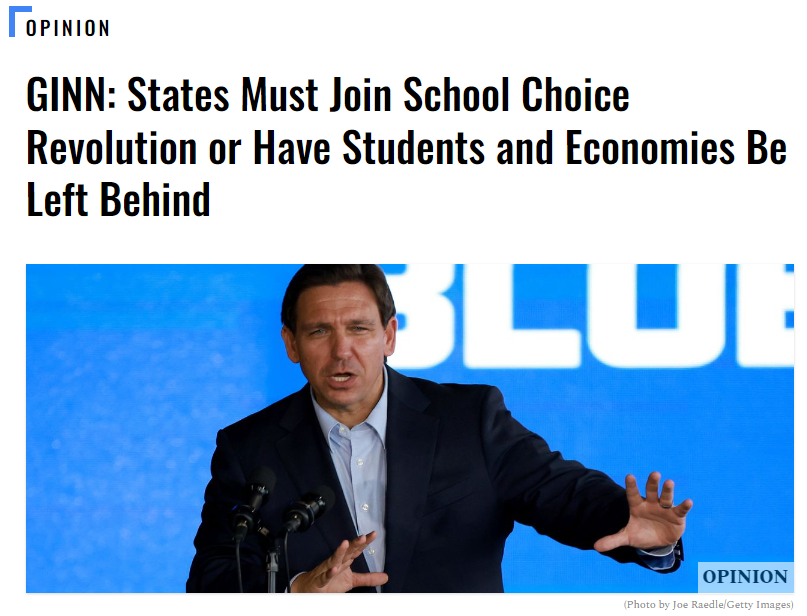Commentary: States Must Join School Choice Revolution or Have Students and Economies Be Left Behind4/20/2023 The school choice revolution in the form of universal ESAs is sweeping the nation. This is extraordinary news for students, parents, teachers, and the economy.
Florida recently became the fourth state to adopt universal school choice in 2023. Earlier this year, Iowa, Utah, and Arkansas joined the rebellion against “public” school monopolies by passing universal school choice after West Virginia and Arizona ignited the revolution last year. There are now more than 10 states with education savings accounts (ESAs), and more likely coming soon. But Texas, Louisiana, Ohio, Alabama, and other states must follow their lead or have their students and economies be left behind. Although there are still naysayers slowing progress, the tide for school choice is growing as more parents and teachers are persuaded that school choice empowers them and their students. But an often overlooked benefit of school choice is it supports a stronger economy. Evidence shows that school choice is connected to improved student outcomes, increased teacher pay, and growing economic opportunity, to name a few of its benefits. School choice’s positive effects on these measures counter the problems in the “public” school system, which is an oxymoron. “Public” schools can exclude students, which a public good can’t do. Also, any positive benefit of this so-called “public good” is questionable at best, given declining test scores and long waiting lines for charter schools. More accurately named, government schools are funded by taxpayers and operated by government employees. As the only “free” option and a monopoly in states without school choice, government schools have little incentive to improve the flawed one-size-fits-few approach. This also contributes to many high-quality teachers being underpaid. Government schools have few reasons to efficiently manage funds because they keep getting more taxpayer money regardless of their outcomes. This helps explain why too much money goes to over-paid administrators instead of teachers, and taxpayers don’t get what they pay for regarding academic and work outcomes. Taxpayers pay about $16,000 per student per year, and that continues to increase over time even after adjusting for inflation. And yet, our students are underperforming academically, falling behind kids in other countries. These outcomes were exacerbated by school shutdowns during the pandemic that left students even less equipped, but this has been a longer-term trend. More school choice is needed to motivate government schools to stop promoting mediocrity. In states like Arizona, where all students above the age of five who live in the state are allotted the same amount of funds, parents of all types now have a range of options, no matter their demographic or socioeconomic status. School choice is finally letting free markets, meaning free people, work in an arena that’s been monopolized by the government for too long. Yes, taxpayers would still fund ESAs. But until states decide to get out of the schooling market, the next best alternative is to allow competition whereby the dollars follow the child instead of to a system. In states like Florida with ESAs, parents can vote with their dollars on the best schooling options for their children, forcing all schools, including government schools, to stay competitive if they hope to attract and keep students by providing the best educational outcomes and extracurricular activities. Giving families more freedom to choose schools, tutoring, and other resources for their unique kids will better equip them to perform better academically and in their careers. Instead of most students — and almost all underprivileged students — being shuffled through the same one-size-fits-few government schooling system, ESAs allow students to flourish into well-rounded adults, leading to better careers, a more productive workforce, and a faster-growing economy. The positive economic ripple effects of a society with more access to better education are myriad. More educated societies tend to experience less crime, decreasing burdens on public services and increasing social trust, which is crucial for the economy. Additionally, more education is linked to higher incomes and improved health. These reduce the number of people in poverty, which reduces the number of people dependent on safety nets funded by taxpayer money, thereby reducing government spending and taxes, resulting in even better economic outcomes. All these elements are conducive to happier, healthier people with more means to prosper, produce, and innovate, which in many ways is the bedrock of a better economy and livelihoods. With more than 10 states providing the option of ESAs, including four states providing universal ESAs this year, why not take it to all 50? Texas, Louisiana, Ohio, Alabama, and others ought to be next or risk their students and economies being left behind. Originally posted at the Daily Caller.
0 Comments
Leave a Reply. |
Vance Ginn, Ph.D.
|


 RSS Feed
RSS Feed